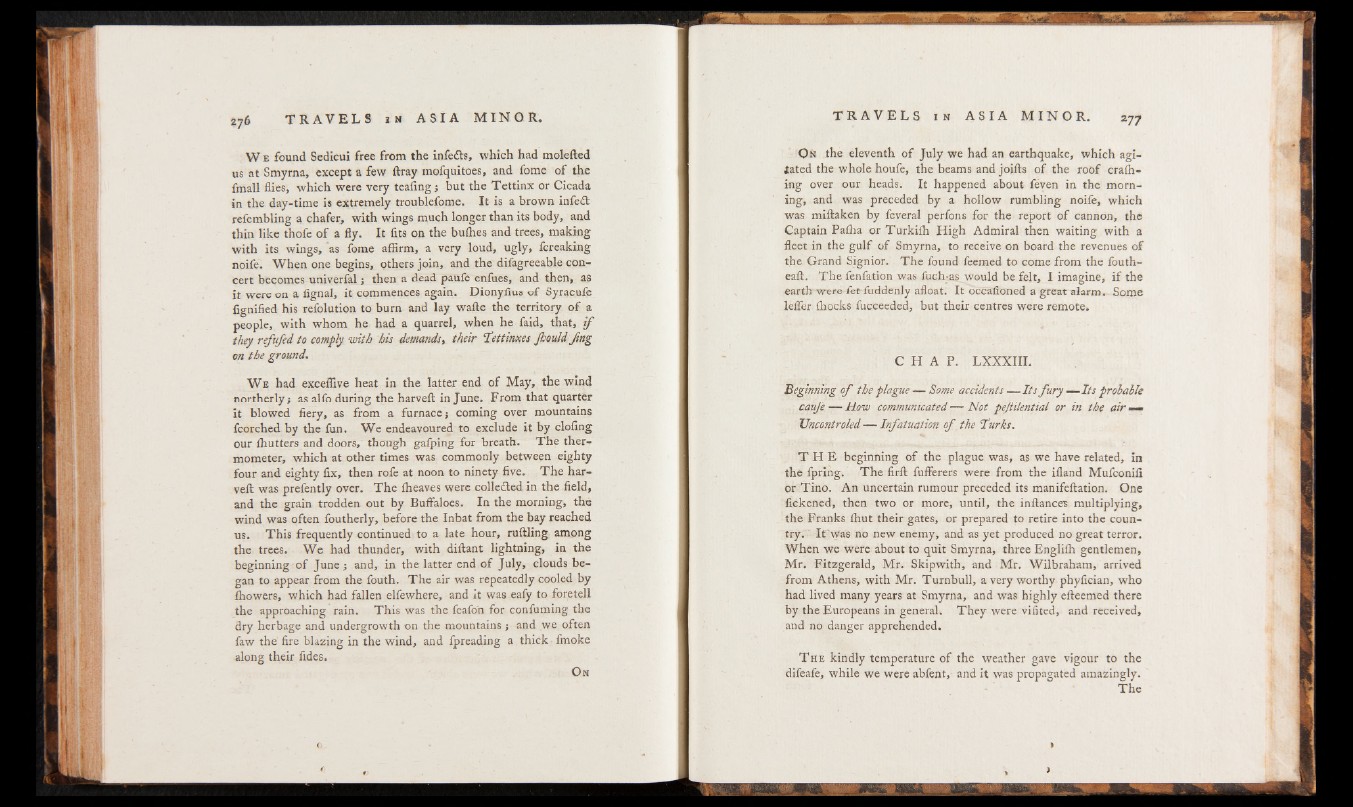
W e found Sedicui free from the infetts, which had molefted
us at Smyrna, except a few ftray mofquitoes, and fome of the
fmall flies, which were very teafing j but the Tettinx or Cicada
in the day-time is extremely troublefome. It is a brown infedt
refembling a chafer, with wings much longer than its body, and
thin like thofe of a fly. It fits on the bullies and trees, making
with its wings, as fome affirm, a very loud, ugly, fcreaking
noife. When one begins, others join, and the difagreeable concert
becomes univerfal j then a dead paufe enfues, and then, as
it were on a fignal, it commences again. Dionyfius of Syracufe
fignified his refolution to burn and lay walle the territory of a
people, with whom he had a quarrel, when he faid, that, i f
they refufed to comply •with his demands, their Tettmxes Jhould Jing
on the ground.
W e had exceflive heat in the latter end of May, the wind
northerly} as alfo during the harveft in June. From that quarter
it blowed fiery, as from a furnace j coming over mountains
fcorched by the fun. We endeavoured to exclude it by doling
our Ihutters and doors, though galping for breath. The thermometer,
which at other times was commonly between eighty
four and eighty fix, then rofe at noon to ninety five. The harveft
was prefently over. The Iheaves were collected in the field,
and the grain trodden out by Buffaloes. In the morning, thé
wind was often foutherly, before the Inbat from the bay reached
us. This frequently continued to a late hour, ruffling among
the trees. We had thunder, with diftant lightning, in the
beginning of June ; and, in the latter end of July, clouds began
to appear from the fouth. The air was repeatedly cooled by
fhowers, which had fallen elfewhere, and it was eafy to foretell
the approaching rain. This was the feafo'n for confuming the
dry herbage and undergrowth on the mountains; and we often
faw the fire blazing in the wind, and fpreading a thick fmoke
along their fides.
On
277
ON ihe eleventh of July we had an earthquake, which agitated
the whole houfe, the beams and joifts of the roof crashing
over our heads. It happened about feven in the morning,
and was preceded by a hollow rumbling noife, which
was miftaken by feveral perfons for the report of cannon, the
Captain Palha or Turkilh High Admiral then waiting with a
fleet in the gulf of Smyrna, to receive on board the revenues of
the Grand Signior. The found feemed to come from the fouth-
eaft. The fenfation was fuch-ag would be felt, I imagine, i f the
earth were let fuddenly afloat. It occafioned a great alarm. Some
leffer (hocks fucceeded, but their centres were remote.
C H A P . LXXXIII.
Beginning o f the plague — Some accidents — Its fury — Its probable
caufe — How communicated — Not peftilential or in the air —
Uncontroled — Infatuation o f the Turks.
T H E beginning of the plague was, as we have related, in
the Ipring. The firft fufferers were from the ifland Mufconifi
or Tino. An uncertain rumour preceded its manifeftation. One
fickened, then two or more, until, the inftances multiplying,
the Franks (hut their gates, or prepared to retire into the country.
It'was no new enemy, and as yet produced no great terror.
When we were about to quit Smyrna, three Englifh gentlemen,
Mr. Fitzgerald, Mr. Skipwith, and Mr. Wilbraham, arrived
from Athens, with Mr. Turnbull, a very worthy phyfician, who
had lived many years at Smyrna, and was highly efteemed there
by the Europeans in general. They were vifited, and received,
and no danger apprehended.
T he kindly temperature of the weather gave vigour to the
difeafe, while we were abfent, and it was propagated amazingly.
The